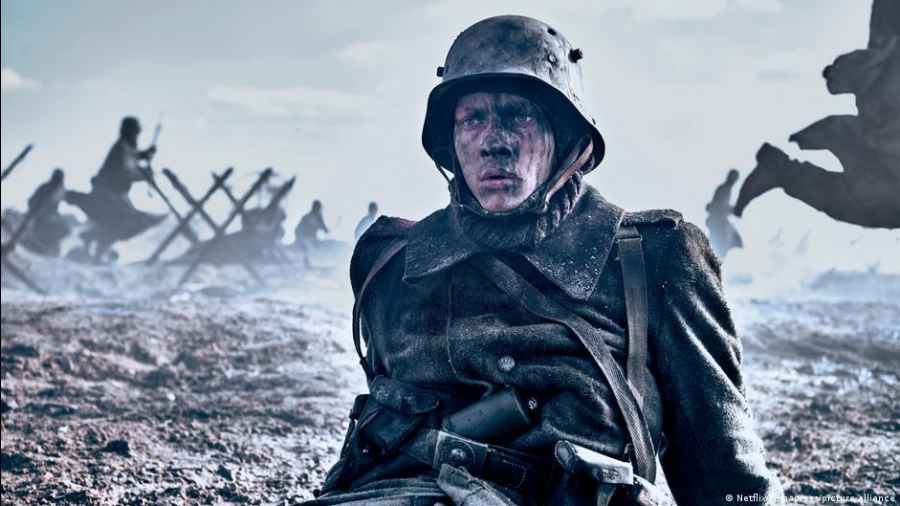Director Edward Berger's anti-war drama has won four Oscars, out of nine nominations. The film has also picked up seven BAFTAs, including for best film.
German composer Volker Bertelmann, better known as Hauschka, has also received an Academy Award for best original score.
Ahead of the award ceremony, the musician told DW about his approach to composing for this film.
DW: You've worked with director Edward Berger several times. What was your first thought when you were asked to write the music for "All Quiet on the Western Front"?
My first thought was actually, "Definitely do it!" — and the second thought was: How do I tell this German story about the war in a manner that leaves it up to people to make up their own minds and to find their own interpretation without pushing them toward one point of view?
Did you write the music during the making of the film, or afterwards?
The film was already finished. I was invited to Berlin for the screening, and it was very clear to me that this was going to be an impressive film.
The next day I had the first theme, the harmonium with these three notes that you hear at the beginning of the film.
I sent the theme to Edward Berger — which is something you don't normally do, you don't send the first idea to the director, you collect maybe 10-15 ideas first so you're sure one of them might work. But in this case, I decided to send him the first idea right away, because it was so strong and clear to me. I wanted to know if he felt the same way.
He called me the next day and was overjoyed: "Fantastic, this is awesome, we're excited, it's exactly how we want it!" At that point it was clear to me that I could actually develop everything with that theme in some way.
You wrote a very minimalistic, but also expressive and frightening score. How did you decide what the music for this film should be?
The first 10 minutes of the film tell the story of the uniform, and for me that was like a collage of images. There's no text, you just see the soldiers slowly leaving for the war. Then the soldiers die. Their uniforms are taken off, they're washed, they are taken to a factory where they are cleaned, and then it's time for the sewing machines to sew new name tags onto the uniforms.
For me, that sequence stands for the machinery of war, for how people were like material. And I felt that the music had to fit the war machine, for instance the sewing machines, in some way. The only way to do that was to take short, iconic elements and have them pop up again and again, like an art installation.
I also thought about the fact that these five young men who go to war lose everything they dreamed of in a relatively short period of time, everything they actually are as humans. Yet they keep on having these moments, where they might hold a woman's scarf in their hands or see a poster of a woman.
In the film, women tend to symbolize what these guys are actually waiting for, where they have a sense of normalcy. That's where there's hope. And I felt like it needed a religious theme to go with the powerful war machine sound.
The main three-note theme that runs throughout the film was played on your great-grandmother's harmonium. What is the story behind that?
I got a call from my hometown more than a year ago about a harmonium which belonged to my family. I checked out the instrument and immediately said, "I want that."
In Düsseldorf, where I live now, there is a gentleman who restores harmoniums. I called him and asked if he could restore it. It then stood in my studio, ready and waiting to be used at some point.
After that first screening in Berlin, I thought it would be great to score the film with an instrument that dates back to that era, and that also works like a machine. I saw the harmonium and immediately figured that might do the trick, it has a bellows, it has air, you hear the wood when you work on it.
I played the first notes, I put it through a distortion and through amplifiers, and that made it so dynamic and powerful that you hear it, but you can't tell for sure what kind of instrument it is.
What was the most difficult thing for you when working on the music for this film?
What was most difficult was actually not to put too much pathos and too much heroism into the music. As a composer, of course, this is a story where you tend to write sad, melancholic melodies. It was very important to keep a distance and appeal to the emotions at the same time.
Seven BAFTA nominations and nine Oscar nominations — what could be the reasons for such great international recognition?
I think it's because people can form their own picture of what's being portrayed. And of course current events certainly played a role as well. It could just as easily have been the other way around, that people would have said they didn't want to see a film about war — but it seemed that the film resonated. The current times, the strong script and the strong execution are also part of it. I think that combination led to the vast majority choosing to honor the film.
This is a translation of the interview conducted by Marina Baranovska in German.











